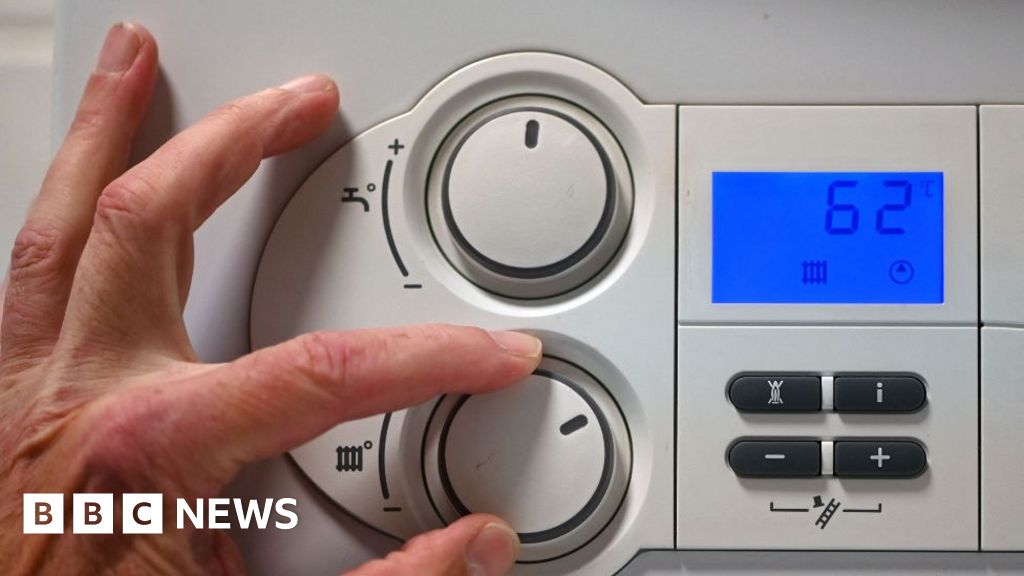- By Angus Cochrane
- BBC Scotland News
Image source, Getty Images
The Scottish government has pushed back its plan to start phasing out fossil fuel boilers by at least three years.
Zero Carbon Buildings Minister Patrick Harvie confirmed the change as the government published a consultation for a new heating bill.
He said the delay made the proposals “fairer and clearer”.
Opposition MSPs have raised doubts about how the decarbonisation plan, estimated to cost £33bn, would be paid for.
The first of the government’s new heating standards come into effect from April, with gas boilers banned from new-build homes and other buildings seeking a building warrant.
Under its original energy efficiency strategy, the government aimed to phase out the need to install new or replacement fossil fuel boilers in off-grid properties from 2025, and from homes connected to the gas mains from 2030.
A “backstop” date of 2045 was set for all homes to use zero direct emissions heating systems.
The targets formed part of the 2021 Bute House Agreement, the power-sharing deal between the Greens and the SNP.
However, Mr Harvie announced in a statement to parliament that a single target date of 2028 had now been set for both on and off-grid properties, describing it as “fairer and clearer”.
He also announced that a target for heating in more than a million homes to be decarbonised by 2030 was no longer possible.
Image source, Getty Images
Green minister Patrick Harvie made the announcement in a statement to parliament
The minister said the government aimed to pass legislation laying the groundwork for its plans in 2025, with secondary legislation required beyond the term of this parliament, due to end in 2026.
“This means that it might be 2028 at the earliest before the first home or building owners are required to act under the terms of those regulations to ensure that we are fair just and proportionate,” he told MSPs.
Under the proposals, people buying homes or non-domestic properties before 2045 would be expected to end the use of polluting heating systems within a “reasonable” period after purchase, with exemptions allowed in some circumstances. The consultation proposed a grace period of between two and five years for people to convert to zero-emissions heating.
“Each individual buying a property would be able to decide how much work needs to be done in that property to bring it up to standard and take account for that in the price that they pay,” Mr Harvie told BBC Radio’s Good Morning Scotland on Wednesday.
However, with the government still aiming to phase out the need to install new or replacement fossil fuel boilers, questions have been raised about when home owners would need to fork out for a new zero-emissions heating system in the event that their boiler broke down.
Mr Harvie said that the government was not yet proposing “trigger points” other than buying a house but that by 2045 all homes would need to converted to zero-emissions heating.
“That’s the target date for net-zero for the whole country so of course we need to have ended our use of fossil fuel heating systems,” he told Good Morning Scotland.
The government did not change its targets for privately rented homes to meet a minimum energy standard by 2028, and for owner-occupied homes to meet the standard by 2033.
Mr Harvie said the government wanted to introduce higher energy standards for homes in the social-rented sector between 2033 and 2040, and for all homes to move to clean heat by 2045, with a third of demand to be met via heat networks. The cut off point for public buildings would be 2038.
He told Good Morning Scotland that cost-of-living pressures, inflation and the UK government “undermining” investment in the green transition by downgrading climate targets had caused the Scottish government to push back its own clean energy ambitions.
The UK government has said its changes – including watering down a plan to phase out gas boilers by 2035 – will make the green transition more affordable at a time when households were under pressure.
‘Ten-year timebomb’
Ministers are aiming to reform Energy Performance Certificate (EPC) ratings, meaning homes with gas boilers would be downgraded compared to those with climate-friendly systems such as heat pumps.
The government has proposed that all residential homes will meet band C in energy performance certificate standards by 2033, “where technically and legally feasible and cost-effective”.
Such requirements could potentially be enforced at certain trigger points, such as when houses are bought and sold, though the government is yet to set out the legal framework for its rules.
Scottish Conservative housing spokesperson Miles Briggs said the plans sparked a “10-year timebomb” for more than half of Scotland’s homeowners.
He said rural properties may need £30,000 of upgrades to meet efficiency standards.
Image source, Getty Images
Scottish Labour net zero spokesperson Sarah Boyack pointed to the £33bn figure and asked where the money was coming from.
“People don’t need warm words, they need warm homes,” she told MSPs.
Mr Harvie said the government had committed more than £1.8bn over the course of this parliament and the government would “continue to build on that track record”.
About a fifth of greenhouse gases in Scotland come from heating buildings. The government wants to cut emissions by replacing fossil fuel boilers with electric heat humps and in some cases hydrogen-powered devices, as well as making use of greener heat networks.
Typically, it costs about £10,000 to buy and install an air source heat pump – the type best suited to most UK homes – although costs vary.
The Scottish government currently offers a grant of £7,500 towards the cost of a heat pump, plus interest-free loans to cover the remainder of the installation.

William Turner is a seasoned U.K. correspondent with a deep understanding of domestic affairs. With a passion for British politics and culture, he provides insightful analysis and comprehensive coverage of events within the United Kingdom.








